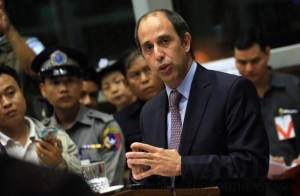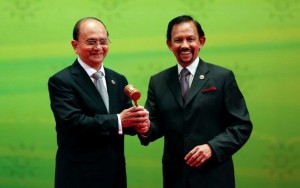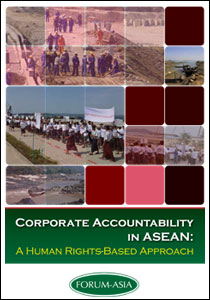Posts Tagged ‘Human Rights Violations’ (349 found)
USCB Welcomes Introduction of The Burma Human Rights and Democracy Act of 2013
Today, the U.S. Campaign for Burma (USCB) welcomes the U.S. Senate’s introduction of The Burma Human Rights and Democracy Act of 2013. The bipartisan measure introduced by Senators Bob Menendez (D-NJ), Marco Rubio (R-FL), Ben Cardin (D-MD), and Bob Corker (R-TN) would prohibit most U.S. military assistance to the Burmese military unless concrete steps are taken to address human rights abuses and constitutional reform […]
• • •Undermining the Peace Process: Burmese Army Atrocities Against Civilians in Putao, Northern Kachin State
Despite ongoing peace negotiations with the Kachin Independence Organization (KIO), in early September 2013 Burmese government troops raided the village of Nhka Ga, near Putao in northern Kachin State, accusing the villagers of supporting the KIA. They detained and tortured ten villagers, shot three men to death, and raped the wife of one of the detainees. The troops have since been encamped in the village, restricting all civilian movement […]
• • •Ongoing Burmese Army Atrocities in Kachin State are Undermining the Peace Process
New documentation by the Kachin Women’s Association Thailand (KWAT) exposes recent atrocities by Burmese government troops against Kachin civilians, despite ongoing peace negotiations.
KWAT’s new update documents abuses committed in Nhka Ga village, near Putao, northern Kachin State, in September 2013 […]
• • •UN Special Rapporteur Demonstrates Ongoing Grave Human Rights Violations
 On 24 October, the Special Rapporteur on the situation of human rights in Myanmar, Tomás Ojea Quintana, presented his report to the United Nations General Assembly. The content of Quintana’s report demonstrates a continuing and, in some cases, a worsening of the human rights situation in Burma today, thus illustrating how imperative it is for the mandate of the Special Rapporteur to be continued.
On 24 October, the Special Rapporteur on the situation of human rights in Myanmar, Tomás Ojea Quintana, presented his report to the United Nations General Assembly. The content of Quintana’s report demonstrates a continuing and, in some cases, a worsening of the human rights situation in Burma today, thus illustrating how imperative it is for the mandate of the Special Rapporteur to be continued.
Of particular concern for Quintana is the situation for Muslims in Burma in the wake of a number of outbreaks of violence in the past 18 months. There are currently 140,000 displaced Rohingya living in camps in Arakan State, segregated from the rest of society. Quintana also stated that the Burma government is not doing enough to address the root causes of this violence, one of which is the institutionalized discrimination against Rohingya, denying them legal status under the 1982 Citizenship Law. Another alarming situation for Quintana are the measures brought in since the violence that have placed restrictions on access to livelihoods, education and healthcare that enforced segregation has facilitated. Furthermore, Quintana expressed deep concern over the role of the authorities themselves in instigating the violence: “Allegations of gross violations since the violence erupted last June, including by state security personnel, remains unaddressed” […]
133 Ethnic Civil Society Organizations Express Concern and Reservation Regarding Foreign Military Engagement with the Burmese Military
Today, October 17, 2013, 133 civil society organizations, representing 15 of Burma’s ethnic nationalities, submitted a joint letter to President Barack Obama of the United States, Prime Minister David Cameron of the United Kingdom, and Prime Minister Tony Abbott of the Commonwealth of Australia expressing great concern and reservation regarding their military engagement with the Burmese military. Along with details of human rights atrocities and ongoing conflict the Burmese military continues to perpetrate, the joint letter pens explicit preconditions that must be met prior to any military engagement and states the criteria for military engagement should it move forward […]
• • •Burma: Joint Letter from Ethnic Nationalities Civil Society Organizations Regarding Foreign Military Engagement with the Burmese Military
Dear President Obama, Prime Minister Cameron, and Prime Minister Abbott,
We, the undersigned 133 ethnic nationalities civil society organizations, are writing to express our concerns and reservations about your countries’ military engagement with the Burmese military.
We appreciate the concern the United States, United Kingdom, and Australia have shown over the years for the human rights violations the Burmese military has committed against us, as well as your support for our pursuit of genuine democracy and national reconciliation. While your intentions may be genuine, we are deeply concerned that your current approach to military-to-military relations will neither prove beneficial to our mutual goals of ending the Burmese military’s perpetration of human rights violations against us, nor bring us closer to national reconciliation […]
• • •Where is the Benefit for the People of Burma?
 The international community’s praising of the Burma government continues amid serious problems in the country. UN Secretary General Ban Ki-moon commended Burma’s “unprecedented reform” as President Thein Sein accepted the long-awaited ASEAN helm on 10 October in Brunei, an opportunity the country’s leaders were forced to give up in 2006 because of the dire human rights situation at the time.
The international community’s praising of the Burma government continues amid serious problems in the country. UN Secretary General Ban Ki-moon commended Burma’s “unprecedented reform” as President Thein Sein accepted the long-awaited ASEAN helm on 10 October in Brunei, an opportunity the country’s leaders were forced to give up in 2006 because of the dire human rights situation at the time.
Despite the ongoing serious violations of fundamental human rights throughout Burma, ASEAN made the decision of granting Burma the chairmanship in 2011. The grouping of ASEAN itself is shaky and suffering from a big gap in the level of democratization among its member states. ASEAN is also quickly approaching its 2015 deadline for economic integration. Handing the chair in this very important time to a member state in transition can create opportunities for the region as Burma reengages with the West, but on the other hand, the decision is also risky, especially when it entails a chair who will predictably be influenced by China, at least on the matter of the disputed South China Sea […]
The Use of Section 18 to Continue Human Rights Abuses in Burma
Section 18 of the Peaceful Assembly and Peaceful Procession Law is being frequently utilized to arrest and imprison political activists for undertaking human rights activism in Burma. AAPP (B) wishes to highlight the ongoing human rights abuses section 18 permits and to make the international community aware of the dangers this poses to the political freedom in Burma […]
• • •Corporate Human Rights Abuses in ASEAN: Civil Society Calls for Corporate Accountability and Compliance with International Human Rights Law
Civil society groups called for greater corporate accountability in the region, which requires a regulatory framework based on international human rights norms and standards, to address the escalation of corporate human rights abuses in ASEAN, during the launch of a report, titled “Corporate Accountability in ASEAN: A Human Rights-Based Approach”, in Jakarta yesterday […]
• • •Corporate Accountability in ASEAN : A Human Rights-Based Approach
 Corporate Accountability in ASEAN: A Human Rights-Based Approach assesses the impacts of business on human rights in the ASEAN sub-region. Originating from cases presented at two public hearings organised by civil society groups in 2011 in response to the ASEAN Intergovernmental Commission on Human Rights (AICHR)’s undertaking of a thematic study on the topic of “corporate social responsibility” (CSR) in ASEAN, this report documents cases of human rights violations in relation to business activities in the sub-region, and demonstrates that voluntary CSR initiatives promoted by businesses – and by ASEAN institutions – are insufficient […]
Corporate Accountability in ASEAN: A Human Rights-Based Approach assesses the impacts of business on human rights in the ASEAN sub-region. Originating from cases presented at two public hearings organised by civil society groups in 2011 in response to the ASEAN Intergovernmental Commission on Human Rights (AICHR)’s undertaking of a thematic study on the topic of “corporate social responsibility” (CSR) in ASEAN, this report documents cases of human rights violations in relation to business activities in the sub-region, and demonstrates that voluntary CSR initiatives promoted by businesses – and by ASEAN institutions – are insufficient […]









 All posts
All posts